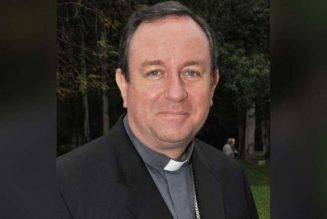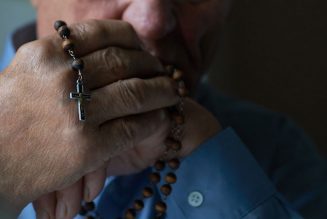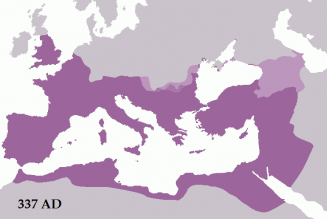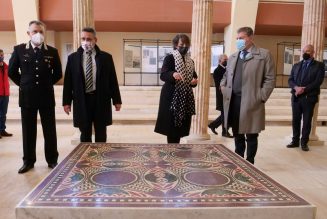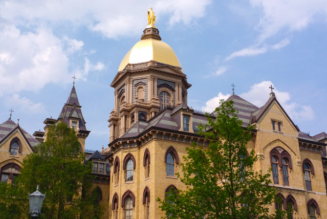 Right before ascending into heaven to sit at his Father’s right hand, Jesus gave his disciples these final instructions: “I am sending the promise of my Father upon you; but stay in the city until you are clothed with power from on high. …You will receive power when the Holy Spirit comes upon you.” After seeing Jesus ascend, the disciples returned to Jerusalem rejoicing. There in the Upper Room, the apostles, the Blessed Virgin Mary, and other Christians (a group of about one hundred twenty persons) devoted themselves with one accord to prayer. After nine days of prayer—the first Christian novena—the Holy Spirit descended upon them on Pentecost.
Right before ascending into heaven to sit at his Father’s right hand, Jesus gave his disciples these final instructions: “I am sending the promise of my Father upon you; but stay in the city until you are clothed with power from on high. …You will receive power when the Holy Spirit comes upon you.” After seeing Jesus ascend, the disciples returned to Jerusalem rejoicing. There in the Upper Room, the apostles, the Blessed Virgin Mary, and other Christians (a group of about one hundred twenty persons) devoted themselves with one accord to prayer. After nine days of prayer—the first Christian novena—the Holy Spirit descended upon them on Pentecost.
The apostles had received this eternal, divine Person before. On Easter Sunday evening, Jesus appeared in the Upper Room and breathed upon them saying, “Receive the Holy Spirit. Whose sins you forgive are forgiven them, and whose sins you retain are retained.” You and I first received the Holy Spirit at our baptisms, when we were “born again / born from above…of water and Spirit,” and made temples of the Holy Spirit. But just as the Spirit came down on Pentecost and filled the disciples in a new way, inspiring and empowering them to announce, make present, and spread Christ’s Church in the world, so we receive the Holy Spirit anew for mission in the Sacrament of Confirmation.
When God the Father sends his Word he also sends his Breath, and the mission of the Holy Spirit is united to the Son’s. Our faith in Jesus leads to our belief in the Spirit and in the good things which flow from both. These blessings are brought to completion through God’s Holy Catholic Church. As the Apostles’ Creed proclaims:
I believe in the Holy Spirit,
the Holy Catholic Church,
the communion of Saints,
the forgiveness of sins,
the resurrection of the body,
and life everlasting. Amen.
As Jesus Christ is the Church’s body, we being his members, so the Holy Spirit is the Church’s soul, our animating Spirit. The Holy Spirit inspires the Church’s Sacred Scriptures, he safeguards her Sacred Tradition and Magisterium from error, he is the Spirit of her liturgies, he empowers her sacraments, he intercedes in her prayers, he builds her up by charisms and ministries, and he manifests holiness in her by each vocation and every saint. As the early Church Fathers said, the Church is the place “where the Spirit flourishes.” The Holy Spirit gives his people gifts of wisdom, understanding, counsel, fortitude, knowledge, piety, and fear of the Lord; and his fruits of love, joy, peace, patience, kindness, goodness, faithfulness, gentleness, and self-control are seen in us. Jesus Christ and the Holy Spirit form the Church and make her holy. At the Last Supper, Jesus prayed for the holy unity of his Church. He said, “Holy Father, I pray not only for [these apostles of mine,] but also for those who will believe in me through their word, so that they may all be one, as you, Father, are in me and I in you, that they also may be in us, that the world may believe that you sent me.” This loving unity is reflected in the communion of the Saints.
In today’s Gospel, some Greeks who had come to worship at the Passover Feast approach the Philip the Apostle and ask him, “Sir, we would like to see Jesus.” Philip goes and tells Andrew the Apostle; then Andrew and Philip go and tell Jesus. Jesus answers them, “The hour has come for the Son of Man to be glorified.” Jesus’ salvific mission is catholic (that is, “universal”). He has come to unite every people and nation in himself. and he sees in this overture from the visiting Greeks a sign that his moment has come. Jesus says, “When I am lifted up from the earth, I will draw everyone to myself.” Jesus gathers them into communion with the one Church he founded, a hierarchical Church (with Christ its Head ordaining that apostles and priests to be her servant leaders) but a Church which is first and foremost interpersonal, communal. No one can baptize themselves; it requires another person. And not even a priest can absolve his own sins. Just so, we are not saved alone, but in communion with others. In the words of Pope St. Paul VI, “We believe in the communion of all the faithful of Christ, those who are pilgrims on earth, the dead who are being purified, and the blessed in heaven, all together forming one Church; and we believe that in this communion, the merciful love of God and his saints is always attentive to our prayer.” As Sts. Andrew and Philip helped those Greeks in reaching out to Jesus, so we lovingly aid one another, by our prayers, penances, and sacrifices, by sharing our material and spiritual goods, helping each other on the way to heaven. But entry into heaven is impossible without the forgiveness of sins.
We believe in the forgiveness of sins. Through Jesus Christ, God’s promises spoken through the Prophet Jeremiah in our first reading are fulfilled: “I will make a new covenant with the house of Israel… I will forgive their evildoing and remember their sin no more.” What was the Risen Christ’s first order of business for his Church when he appeared to his apostles in the Upper Room on Easter? After assuring them that it was really him and that he wished them peace, he gave his apostles the power and authority to forgive sins (as we noted before). Baptism into Christ washes away our past sins, but what if we grievously sin after baptism? We cannot be baptized twice. Since Christ has given his Church the power to forgive sins, then baptism cannot be her only means of forgiveness. The Sacrament of Penance is necessary for salvation for those who have fallen after Baptism, just as Baptism is necessary for salvation for those who have not yet been reborn in Christ.
There is no offense, however serious, that the Church cannot forgive. There is no one, however wicked or guilty, who may not confidently hope for forgiveness, provided their repentance is sincere. Christ, who died for all men, desires that the gates of forgiveness in his Church should be open to anyone who turns away from sin. If you could use a good Confession, mark your calendars to come here to St. Paul’s next Sunday, on Palm Sunday afternoon. Apart from making another appointment, it might be your last chance for a Lenten Reconciliation with God.
But what good would God’s forgiveness be if death were the end of us? We believe in the resurrection of the body. Jesus tells Philip and Andrew, “Amen, amen, I say to you, unless a grain of wheat falls to the ground and dies, it remains just a grain of wheat; but if it dies, it produces much fruit.” Here, as elsewhere, Jesus foretells of his resurrection, for the buried seed which dies then rises from the earth. Jesus then goes on to say, “Whoever serves me must follow me, and where I am, there also will my servant be.” This is not only a call to discipleship but a promise of resurrection: ‘Whoever serves me must follow after me, from the tomb of death to the resurrection of life, and where I am (whether in heaven or in the New Creation to come) there also will my servant be with me.’ Jesus says, “Whoever loves his life loses it, and whoever hates his life in this world will preserve it for eternal life.”
We believe in life everlasting. And this new life doesn’t begin only once we die, or after God raises up our bodies “on the last day.” We can already taste eternal life now. From your worst sins you have had small glimpses of hell, and in Jesus Christ you have already experienced small glimpses of heaven. But our eyes have not seen, and our ears have not heard, and our hearts have not conceived the fullness of what God has prepared for those who love him. Scripture speaks of it in images: of life, light, peace, wine, a wedding feast, the Father’s house, the heavenly Jerusalem, paradise. God will wipe away every tear from our eyes and death will be no more, neither will there be any more mourning or crying or pain, for these things will have passed away. And when we enter this perfect, unending life with the Most Holy Trinity and all the saints, it will be the ultimate fulfillment of our deepest human longings; supreme and definitive happiness.
In conclusion, The Apostles’ Creed ends with the same final word as the last book of the Bible, the word at the end of the Church’s many prayers: “Amen.” In Hebrew, “amen” comes from the same root as the word “believe,” expressing solidity, trustworthiness, and faithfulness. In saying “Amen” we are professing both God’s faithfulness towards us and our trust in him. The Creed’s last word “Amen” repeats and confirms its first words, “I believe,” and everything in between. As St. Augustine preached, “May your Creed be for you as a mirror. Look at yourself in it, to see if you believe everything you say you believe, and rejoice in your faith each day.” This is our Faith. This is the Faith of the Church. We are proud to profess it in Christ Jesus our Lord. Amen
Join Our Telegram Group : Salvation & Prosperity

